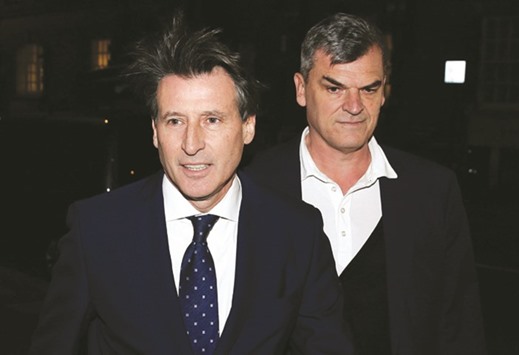‘Mr Davies has admitted misleading the investigation. That is an extremely serious matter. It is all the more serious for the fact that Mr Davies only admitted his lie when his hand was forced upon requests being made of him for his bank statements’
Nick Davies, one of IAAF president Sebastian Coe’s closest aides, has been expelled from world athletics’ governing body for concealing a 30,000 euro ($32,000) payment from disgraced ex-head Lamine Diack linked to the Russian doping scandal.
An International Association of Athletics Federations ethics board found that the influential former deputy secretary general had lied to the enquiry over the funds.
Davies’ wife and IAAF project manager Jane Boulter-Davies and medical manager Pierre-Yves Garnier were both allowed to resume working for the world body, the former on a six-month probation period, after serving suspensions of six and three months respectively. Each was ordered to pay 2,500 euros in costs.
But the ethics board ordered that Davies, named by Coe as his chief of staff when he took over in August 2015, was “expelled from his position with the IAAF with immediate effect” and ordered to pay 5,000 euros in costs.
Davies’ downfall was “accepting a concealed remuneration” through Diack’s son Papa Massata Diack, lying about it to the ethics board and failing to disclose it to French judicial authorities and the World Anti-Doping Agency (WADA). Davies received 30,000 euros, 5,000 paid into his joint bank account with Boulter-Davies, while 25,000 euros went into his own account, without his wife’s knowledge.
“Mr Davies has admitted misleading the investigation,” said an ethics board report.
“That is an extremely serious matter. It is all the more serious for the fact that Mr Davies only admitted his lie when his hand was forced upon requests being made of him for his bank statements.”
Davies, the board said, “has admitted a serious error of judgement and has reflected upon and sincerely apologised for that error”. Davies will be free to seek employment elsewhere in athletics and to be involved in IAAF organised competitions. He can also still appeal to the Court of Arbitration for Sport.
IAAF chief executive officer Olivier Gers said: “We thank the Ethics Board, in particular Sir Anthony Hooper, for the detailed investigation and would like to acknowledge the Ethics Board’s findings that none of the individuals had any case to answer with regards to corruption and all three were commended on their efforts to ensure cheats in the sport were properly identified and bought to justice.”
The allegations stem from an email sent by Davies to Papa Massata Diack on July 19 before the 2013 World Athletics Championships in Moscow which outlined a plan to delay naming Russian doping cheats to avoid bad publicity.
In the email to Papa Massata, a marketing consultant, Davies suggested a “very secret” five-point plan to manage media reaction to doping failures.
Lamine Diack is now under house arrest in France on corruption and money laundering charges while Papa Massata is wanted by French authorities but is in his native Senegal.
The ethics board ruling came on the same day that Coe again found himself in the spotlight amid allegations he knew of corruption claims concerning the Russian doping scandal four months before they became public. Coe told a House of Commons committee in December 2015 he was “not aware” of specific allegations of corruption in Russian athletics until a German documentary in December 2014.
But in an August 2014 email to the IAAF ethics commission published on Tuesday by the parliament culture, media and sport committee, Coe, a two-time Olympic 1500m champion, stated: “I have now been made aware of the allegations.”
Coe denies misleading doping committee
Meanwhile, Coe denied that he misled a British Parliamentary committee investigating doping in sport when he appeared before it last December.
Central to Coe’s evidence was his insistence that he did not know the specific detail of an email sent to him by former London Marathon race director David Bedford, which Coe says he sent to the IAAF Ethics Commission without opening the attachments.
Bedford told the Parliamentary Committee this month that he was surprised to hear that Coe had not read the attachments of the 2014 mail and committee chairman Damian Collins said Bedford’s evidence had raised questions over “the timing and extent of Lord Coe’s knowledge of these allegations”.
A mail sent by Coe to Michael Beloff, head of the Ethics Committee, and released by the Parliamentary Committee yesterday, suggested the IAAF President was aware of the detail of the allegations.
Coe’s mail to Beloff referred to the receipt “documentation of serious allegations being made by and on behalf of the Russian female athlete (Liliya) Shobukhova from David Bedford”.
“The purpose of this note is of course to advise you that I have now been made aware of the allegations,” Coe added.
Coe, however, said he did not know the specifics of Bedford’s claim and explained why in a four-page email to Collins this week which was made public by the committee. “I wish to confirm that to the best of my recollection I was not aware prior to December 2014 of the allegations that Papa Massata Diack/others associated with the IAAF were involved in covering up Russian doping,” Coe, who was an IAAF vice-president at the time before being elected president in 2015, wrote.
“This is even though I accept that in August 2014 David Bedford emailed me documents containing allegations along those lines,” he added.
“I trust this clarifies the matter to the satisfaction of the committee and as such there are no grounds for suggesting I misled the committee in any way.”

A file photo of IAAF president Sebastian Coe (left) with Nick Davies, then deputy general secretary of the IAAF. (AFP)
